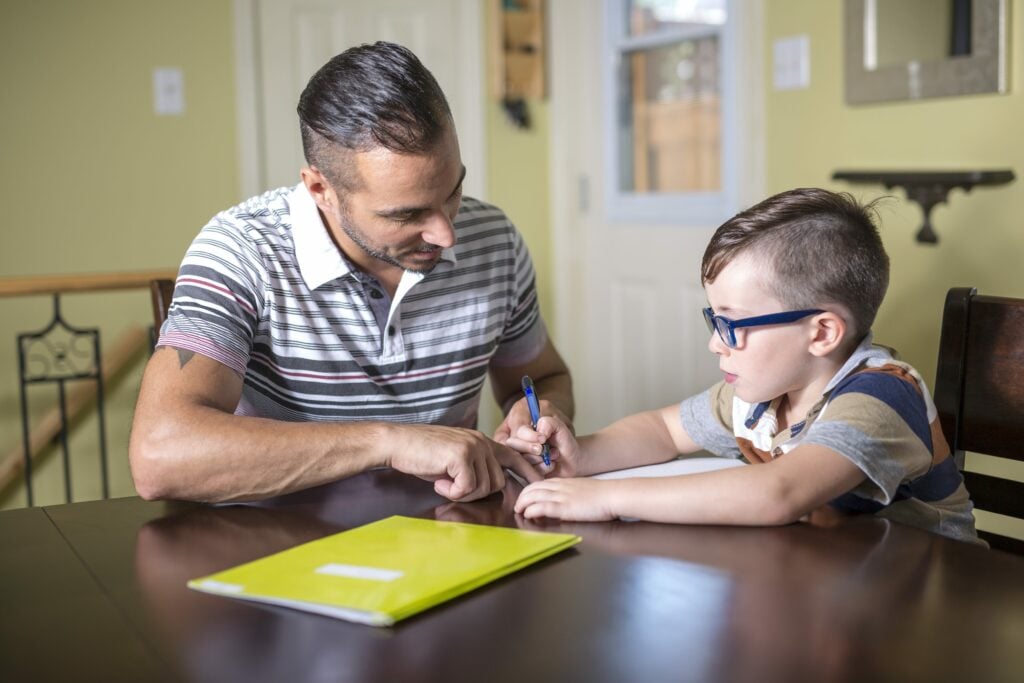Families and mental health
Reviewed by Brooks Baer, LCPC, CMHP

What is family?
There’s no single definition of “family.” Throughout time, across nations, and in different cultures, family has meant different things to different people. For some, it refers to generations of common ancestors living on the same land; for others, it consists of a small group of unrelated friends. No matter how you define it, your family has a huge impact on your mental health.


Every person alive today was once a child. Your childhood family laid the foundation for your understanding of the world. Its lessons, whether explicitly or implicitly taught, affect how you:
- Relate to your body physically
- Process your life mentally
- Express yourself emotionally
- Conduct yourself socially
- Identify yourself spiritually
Types of family
The definition of “family” is broad, but most families fit into at least one of five categories: biological, nuclear, blended, extended, and found.
- Biological family members are related genetically. In addition to parents and siblings, extended and ancestral relatives are also part of your biological family. Note that members of foster families, adopted families, and blended families may not be genetically related, but they’re still family. Similarly, estranged biological relatives may not consider each other family even though they’re genetically related.
- Nuclear families are core family groups consisting of parents and children. They can look like single-parent households, parents and children, or childless couples. They can include foster children and adopted children. Pets may also be considered part of a nuclear family.
- Blended families consist of two or more nuclear families coming together to create a new family unit, usually through marriage or domestic partnership. They can include stepchildren, stepparents, half-siblings, biological relatives of foster and adopted children, and more.
- Extended families tend to consist of relatives beyond parents and children, such as grandparents, cousins, aunts, and uncles. Some cultures consider extended family to be part of the nuclear family, especially if they live together.
- Found families consist of small social groups who share deep connections and participate in each other’s daily lives. These family connections may last a lifetime or only for a season. They can include roommates, colleagues, groups of friends, or small communities with shared experiences.
Family relationship dynamics
Just as there are many different types of families, there are a range of family relationship dynamics. You probably identify with multiple family roles (parent, child, sibling, partner, grandchild), and the ways these roles intersect and overlap can affect your identity and your mental health.
Common family relationship dynamics include:
- Parent-child: This is the first family dynamic most of us experience. If someone doesn’t know (or is rejected by) their parents, the absence of a parent-child relationship can also be deeply impactful. Later in life, many people become parents and experience this dynamic from the opposite side.
- Sibling-sibling or only child: How many siblings you have, how large the age gaps between you are, and how closely you relate to them affect your identity and your mental health. Being an only child is also influential.
- Partners or spouses: Spouses and partners can be a form of family. Committing to a long-term romantic relationship also creates new family roles to navigate—be it as a partner, an in-law, a roommate, or a potential parent.
- Coparents: If you aren’t partnered with your child’s other parent, you may have to learn how to balance parenting responsibilities with them while being partners with someone else or living on your own.
- Pets: Pets are a joyful part of any family. They also create new family dynamics. Many of us learn caregiving skills while caring for animal companions. Similarly, many of us first experience grief after losing a pet.
Characteristics of functional families
Families can create a solid foundation of identity, security, and mental health. They can also leave scars and wounds when they’re unhealthy or dysfunctional.
Because you’re enmeshed within your own family, it can be hard to tell whether its dynamics are healthy, dysfunctional, or actively harmful. Working with a therapist can help you identify how your childhood and family affected your mental health.
There’s no such thing as a perfect family, and what works for some families may not work for others. But in general, functional families tend to share some traits:
- Unity: Family members see each other as part of the same unit. They claim each other as family and want to see the other members flourish.
- Safety: Family members protect and provide for each other consistently and in ways that are appropriate for their roles. For example, parents protect and provide for their children, instead of children protecting and providing for their parents (not including adult children of elderly parents).
- Empathy: Family members attempt to understand one another emotionally. When members express their feelings or share different perspectives, they aren’t shamed or punished. Family members don’t revel in each other’s struggles—instead they offer help and support.
- Boundaries: Family members care for one another while understanding their own limits and prioritizing self-care. They also respect each other’s boundaries and limits. Family members are interdependent, not codependent.
- Communication: Family members communicate clearly and directly and can express their love and care verbally. When angry, they’re assertive while still being receptive—not passive-aggressive, aggressive, abusive, or violent. Family members are willing to listen to and learn from one another.
Complicating factors of family relationships
Even the most loving families can face challenges because of factors outside their control. Common factors that influence family dynamics include:
- Age/generation: Differences in age, generation, cultural norms, and upbringing can strain relationships between parents, children, and siblings with a large age gap.
- Race/ethnicity: Cultural expectations based on race and ethnicity, as well as discrimination faced inside and outside the home, can complicate family relationships.
- Gender: Cultural expectations around gender roles and gender expressions can harm family members who differ from those norms.
- Sexuality: Lack of acceptance can harm LGBTQIA+ family members.
- Disability: People with disabilities may face discrimination both inside and outside the home.
- Socioeconomic class: Financial struggles around providing food, shelter, school, health care, and other necessities can cause significant family stress.
- Religion/values: Differences in religious beliefs or values can cause strain between family members.
- Mental health: When a family member has a mental illness, it can strain family relationships.
Mental health and families
How does your family history affect your mental health?
- Genetics: People whose families have a history of mental illness are more likely to develop mental health disorders.
- Epigenetics: Trauma may change the way certain genes are expressed by causing them to turn “on” or “off.”1 These altered gene expressions (known as “epigenetic changes”) are then passed down to children and grandchildren who never experienced the trauma but still carry its legacy. Epigenetic change is one form of generational trauma.
- Learned behaviors: Not all mental health conditions are purely the result of genetics. We can learn unhelpful or harmful behaviors from our family’s direct teachings, or indirectly through an unpredictable or unstable family environment.
Impact of family problems
A troubled home life can cause or worsen mental health conditions, including:
- Trauma and posttraumatic stress disorder (PTSD)
- Abuse and neglect
- Anxiety
- Depression
- Grief
- Obsessive-compulsive disorder (OCD)
- Eating disorders
- Other mental illnesses
How mental health affects family relationships
Just as families can affect mental health, mental health can affect families. Mental illness in a family often affects members differently, depending on their role in the family and how functional or dysfunctional the family may be.
For example, if your partner has a mental health condition, you may choose to attend couples counseling together. This can help you learn both learn ways to support each other and understand what your partner’s diagnosis means for your relationship.
On the other hand, if your parent has a mental illness, you may have little say in whether or not they seek treatment. Their untreated condition may manifest in ways that harm your own mental health. (In that case, you may benefit from receiving individual therapy.)
If you’re the one struggling with your mental health, your family may be either a source of love and support or a roadblock to healing. Whether or not your family can offer the help you need, you are not alone. If you’re in crisis, call or text the 988 Lifeline at 988 for support anytime.
How to talk to your family about mental illness
- Take care of yourself first. You’ve probably heard this airplane analogy before: You need to put on your own oxygen mask before you help someone else with theirs. This applies to mental health as well. Before you can support a loved one, make sure you’re taking care of yourself and have the emotional space to discuss heavy topics.
- Destigmatize mental health. Mental health conversations are still stigmatized in many cultures, which means the topic has remained taboo in a lot of families. When discussing mental health problems, make it clear you don’t view them as a weakness or a moral failure. Instead express love and support, and let curiosity and compassion motivate you to learn more about your family member’s condition.
- Ask questions: Normalize asking questions about mental health in your family, such as “How are you feeling?” or “What’s on your mind today?” If someone seems to be struggling, ask how they’re doing and if there’s anything you can do to help. Compassionate questions help create an environment where people feel safe sharing their emotions and their challenges.
- Express concern. If your family member is having a hard time or seems hesitant to seek treatment, it’s okay to express your concern. They may not know or believe that you care until you say so directly.
- Learn together. Some people will try to “handle” a family member’s mental illness by diving into research and trying to find a solution. It’s important to not treat your family member like a problem to be solved. Let them know you want to learn more about their condition, and seek out ways to learn together.
- Encourage them to get help. Let your family member know you hope they’ll explore all their options for treatment. Gently remind them there’s no shame in getting help through therapy, medication, or both.
- Join a support group. It can be difficult to love and care for someone struggling with their mental health. Consider joining a support group for people whose loved ones have the same (or a similar) condition.
Seeking treatment
Family therapy
There are many kinds of family therapy, including:
- Supportive family therapy creates a safe environment for participants to express concerns, feelings, and problems.
- Systemic family therapy helps family members address and understand the implicit messages they send to each other, all while improving communication skills.
- Structural family therapy strengthens relationships and boundaries to help families develop healthier patterns of interacting.
- Strategic family therapy addresses family communication and decision-making through homework assigned by the therapist.
Other therapies
The whole family can benefit when individuals or partners seek therapy. A number of types may be beneficial, including:
- Cognitive behavioral therapy (CBT)
- Acceptance and commitment therapy (ACT)
- Dialectical behavioral therapy (DBT)
- Internal family systems (IFS) therapy
- Emotionally focused individual therapy (EFIT)
- Eye movement desensitization and reprocessing (EMDR)
If you’re seeking treatment for your mental health or a family member’s mental health, browse our directory to find a licensed provider near you.

About the author
The editorial team at therapist.com works with the world’s leading clinical experts to bring you accessible, insightful information about mental health topics and trends.
Related articles

Advocating for your K-12 child with disabilities
Many school districts offer resources for K-12 kids with disabilities. Learn...

To stay together forever, get a sleep divorce
One in five couples sleep in separate rooms. So why do we still feel so weird...

Child life specialists: What they do and how they can help
Find out what child life specialists do and how they can help support kids and...

The relationship between faith and therapy
Mental health professionals and faith leaders offer different kinds of guidance...
